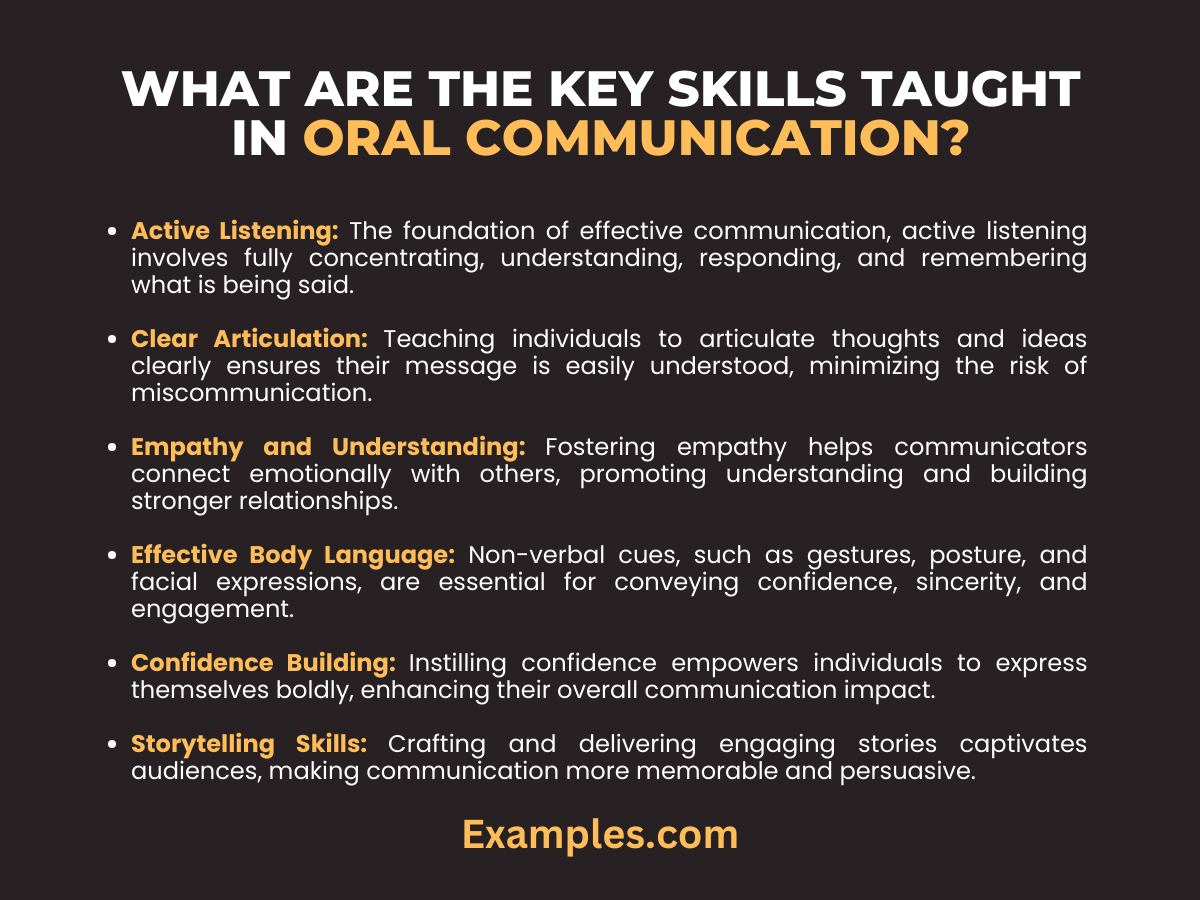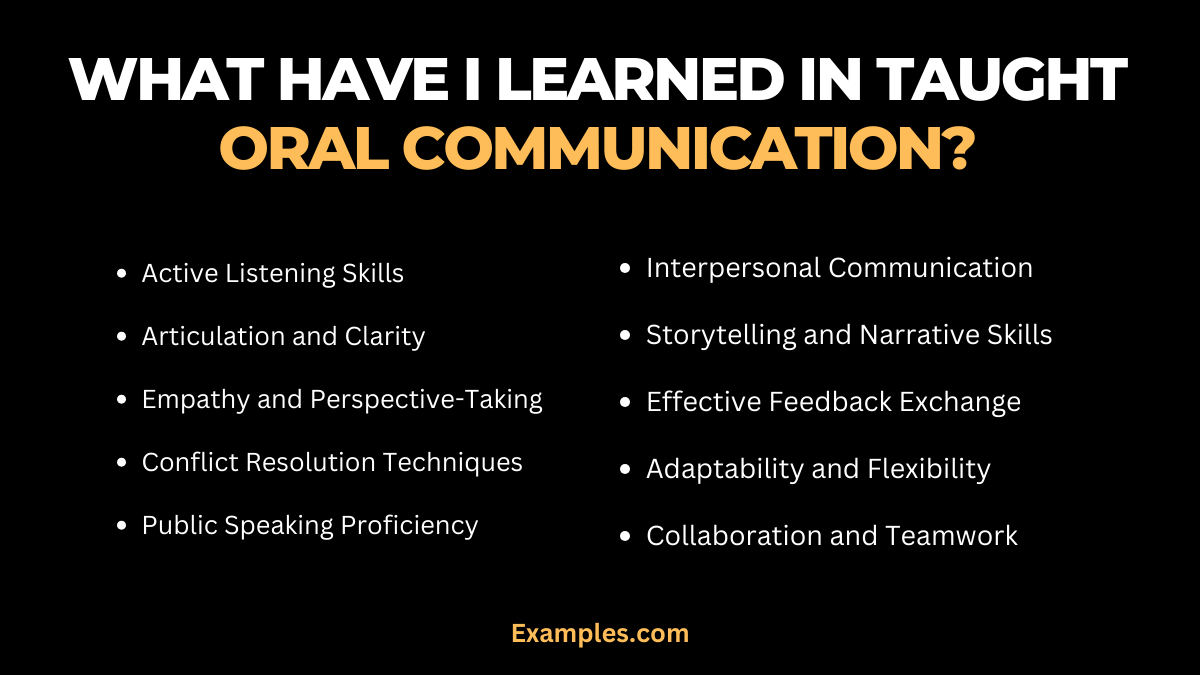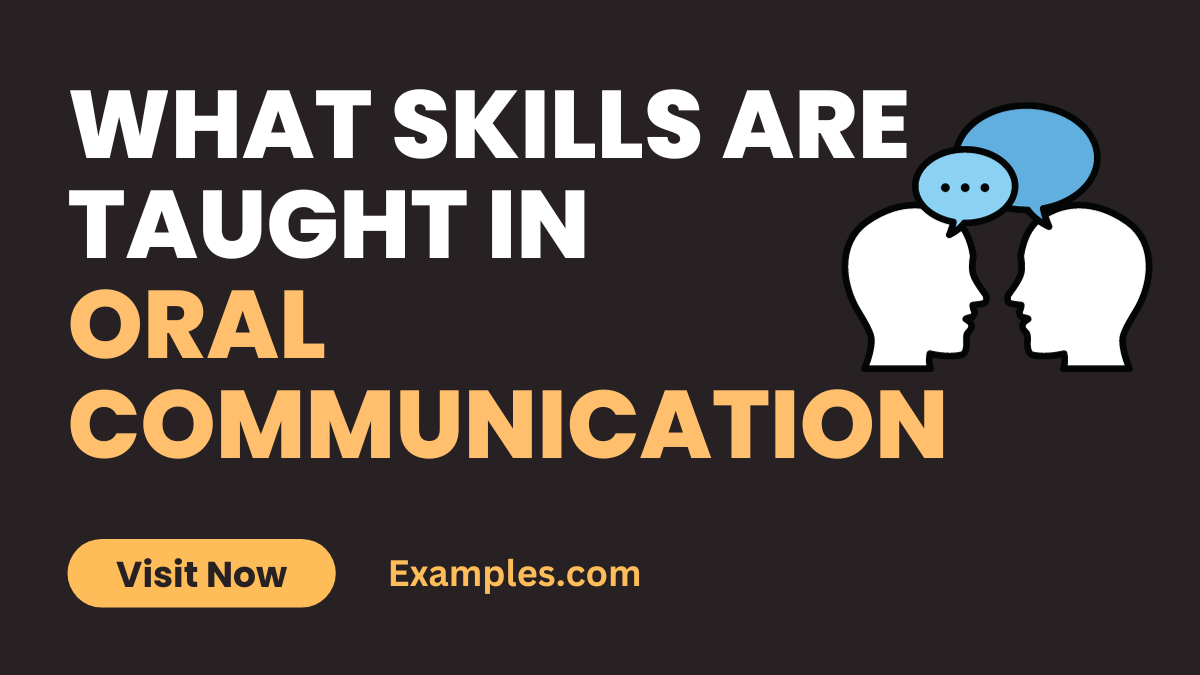What Skills are Taught in Oral Communication?
Embark on a journey of mastering oral communication with our guide on “What Skills are Taught in Oral Communication.” Explore the definition, delve into historical perspectives, and uncover practical tips and examples. From the roots of communication to contemporary techniques, this comprehensive resource empowers you with the essential skills, offering a holistic approach to articulate, connect, and excel in oral communication. Boost your confidence and competence in every spoken word with our insightful guide.
What Skills are Taught in Oral Communication?
In simple terms, “What Skills are Taught in Oral Communication” refers to the comprehensive set of abilities and techniques imparted to individuals to enhance their spoken communication proficiency. From foundational skills like active listening to advanced techniques such as persuasive speaking, this encompasses a broad spectrum. The focus is on nurturing effective verbal expression, fostering understanding, and empowering individuals to communicate confidently and persuasively in various contexts.
What Are the Key Skills Taught in Oral Communication?
Effective oral communication involves a diverse range of skills that contribute to clear, impactful, and meaningful interactions. Here are some key skills taught in oral communication:

- Active Listening: The foundation of effective communication, active listening involves fully concentrating, understanding, responding, and remembering what is being said.
- Clear Articulation: Teaching individuals to articulate thoughts and ideas clearly ensures their message is easily understood, minimizing the risk of miscommunication.
- Empathy and Understanding: Fostering empathy helps communicators connect emotionally with others, promoting understanding and building stronger relationships.
- Effective Body Language: Non-verbal cues, such as gestures, posture, and facial expressions, are essential for conveying confidence, sincerity, and engagement.
- Confidence Building: Instilling confidence empowers individuals to express themselves boldly, enhancing their overall communication impact.
- Storytelling Skills: Crafting and delivering engaging stories captivates audiences, making communication more memorable and persuasive.
- Persuasive Speaking: Teaching the art of persuasion enhances individuals’ ability to influence, motivate, and inspire others through their spoken words.
- Conflict Resolution: Equipping individuals with conflict resolution skills helps them navigate disagreements diplomatically, fostering positive relationships.
- Adaptability and Flexibility: Effective communicators can adapt their style to different audiences and situations, enhancing their overall versatility.
- Feedback Mechanisms: Developing the ability to give and receive constructive feedback promotes continuous improvement in communication skills.
What is the beneficial of studying in oral thought communication?
Studying oral communication skills yields multifaceted advantages, significantly impacting personal and professional spheres.
- Enhanced Interpersonal Relations: Strengthening communication skills fosters richer, more meaningful interactions, nurturing better relationships with friends, family, and colleagues.
- Professional Success: In the workplace, refined oral communication translates to improved collaboration, effective leadership, and heightened chances of career advancement.
- Confidence Boost: Mastering oral communication instills confidence, empowering individuals to express themselves eloquently in diverse situations.
- Critical Thinking Development: The study of oral communication cultivates critical thinking skills, encouraging individuals to articulate and defend their perspectives with clarity.
- Global Connectivity: In an interconnected world, strong communication skills facilitate seamless interaction in multicultural settings, transcending linguistic and cultural barriers.
- Empathy and Understanding: Effective oral communication training promotes empathy, enhancing the ability to comprehend and respond thoughtfully to others’ perspectives.
- Influence and Persuasion: Proficiency in oral communication equips individuals with the power to persuade and influence, a valuable asset in various personal and professional scenarios.
- Adaptability in Communication Styles: Studying oral communication encourages the development of adaptable communication styles, enabling effective engagement with diverse audiences.
- Conflict Resolution Skills: Individuals with strong oral communication skills are better equipped to navigate conflicts diplomatically, fostering harmonious relationships.
- Continuous Personal Growth: Investing time in studying oral communication is a commitment to ongoing personal development, refining skills that are crucial throughout one’s life journey.
What Have I Learned in Taught Oral Communication?
Oral communication instills a myriad of skills essential for effective expression and understanding. Understanding the core components reveals the depth and significance of what’s learned:

- Active Listening Skills: Mastery in active listening, understanding verbal and non-verbal cues.
- Articulation and Clarity: Enhancing clarity in conveying thoughts and ideas cohesively.
- Empathy and Perspective-Taking: Grasping diverse viewpoints, fostering empathy and inclusivity.
- Conflict Resolution Techniques: Strategies for navigating conflicts and fostering amicable solutions.
- Public Speaking Proficiency: Developing confidence and competence in public speaking settings.
- Interpersonal Communication: Nurturing interpersonal skills for effective one-on-one interactions.
- Storytelling and Narrative Skills: Cultivating the art of engaging storytelling for impactful communication.
- Effective Feedback Exchange: Learning to give and receive constructive feedback for personal and collective growth.
- Adaptability and Flexibility: Developing agility to adjust communication style in varying situations.
- Collaboration and Teamwork: Skills for effective collaboration, encouraging collective achievement.
What Skills Are Taught in Oral Communication in Teaching?
Oral communication in teaching extends beyond basic verbal expression, emphasizing essential skills crucial for effective interaction in educational settings.
- Active Listening: Educators impart the skill of attentive listening, fostering understanding and empathy in both teachers and students.
- Clarity and Conciseness: Teaching emphasizes clear and concise verbal communication, aiding in effective knowledge transfer.
- Questioning Techniques: Techniques for posing questions encourage student engagement and participation, honing communication skills.
- Adaptability: Educators learn to adapt communication styles for diverse student needs, ensuring inclusivity in teaching environments.
- Feedback Delivery: The art of providing constructive feedback is taught, promoting positive reinforcement and academic growth.
- Non-Verbal Communication: Understanding and utilizing non-verbal cues enhance communication effectiveness in educational interactions.
- Presentation Skills: Educators are trained to present information effectively, refining the art of engaging and impactful communication.
- Conflict Resolution: Techniques for resolving conflicts verbally instill a positive and collaborative atmosphere in the educational setting.
- Storytelling: The skill of storytelling is imparted, fostering engaging and memorable communication to enhance the learning experience.
- Empathy and Understanding: Teaching communication skills includes promoting empathy and understanding, creating a supportive and nurturing learning environment.
In conclusion, the journey through the realm of oral communication skills reveals a world where words wield power and influence. Mastering these skills unlocks a multitude of benefits, enhancing personal relationships, paving the way for professional success, and bolstering confidence in diverse situations. The art of effective oral communication is a continual learning process, one that enriches not only the speaker but also the listener, fostering a deeper understanding and empathy.
For those eager to further their journey in oral communication, resources like Brookes Publishing’s blog offer “14 Ways to Improve Your Students’ Oral Language Skills,” providing practical tips for educators and learners alike here. Additionally, Toastmasters International offers a treasure trove of public speaking tips, helping individuals refine their communication prowess in various settings. Explore their resources here to continue developing your oral communication skills, whether for personal growth, professional advancement, or the sheer joy of connecting with others through the spoken word.



